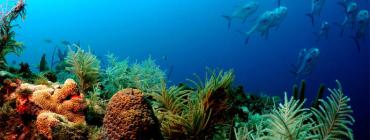
A Florida congressman is doubling down on his proposal to have the U.S. Commerce Department “issue regulations prohibiting the use of sunscreen containing oxybenzone or octinoxate in a National Marine Sanctuary in which coral is present, and for other purposes.”
Last month, U.S. Rep. Francis Rooney, R-Fla., introduced a bill banning the “human use of oxybenzone and octinoxate near coral reefs in National Marine Sanctuary System including the Great Florida Reef found off the coast of the Florida Keys” with U.S. Rep. Debbie Mucarsel-Powell, D-Fla., as a cosponsor. Since then, the bill has gained three more cosponsors including U.S. Rep. Alcee Hastings, D-Fla.
Rooney explained the rationale behind the proposal when he brought it out last month.
“These chemicals are killing our coral reefs, which are vital to the marine ecosystem here in Florida and around the world,” Rooney insisted. “Reefs play a major role in preventing shore erosion and protect coastal wetlands. Their preservation is a key component of our tourism-based economy. I introduced the Defending Our National Marine Sanctuaries from Damaging Chemicals Act to protect these critical areas so that they can be enjoyed and studied for generations to come. It is common sense to prevent the application of these chemicals in National Marine Sanctuaries.”

“Coral reefs support more species per unit area than any other marine environment, including about 4,000 species of fish, 800 species of hard corals and hundreds of other species," Rooney’s office noted. “The commercial value of U.S. fisheries from coral reefs is over $100 million. Coral reefs may provide goods and services worth $375 billion each year.”
Rooney ramped up his efforts on the proposal on Monday when he wrote U.S. Rep. Raul Grijalva, D-Ariz., the chairman of the U.S. House Natural Resources Committee, and U.S. Rep. Rob Bishop, R-Utah., the top Republican on the committee, on the matter.
“This straightforward bill would safeguard our federally protected coral reefs by prohibiting the human use of oxybenzone and octinoxate within National Marine Sanctuaries where coral is present. These reefs are vital to the marine ecosystems across the United States and around the world and we need to understand the long-term effects that these chemicals could have on our waters and marine systems,” Rooney said on Monday.
“Coral reefs support more species per unit area than any other marine environment, and the commercial value of U.S. fisheries from coral reefs is over $100 million annually. That does not include their value to the tourism industry, for scientific study, or their role as a natural barrier between coastal erosion and storms,” Rooney added. “It is imperative that we keep these vital ecosystems healthy- humans and marine life depend on them every day.”
In the meantime, there remains no version of the bill over in the U.S. Senate.


